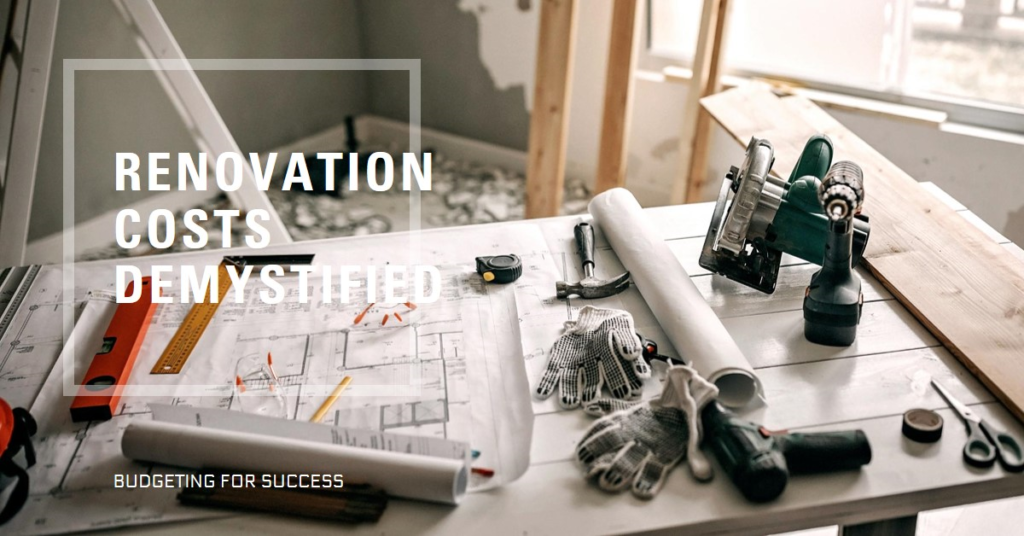
Table of Contents
Introduction to Renovation Costs:
Renovation Costs, Embarking on a renovation journey can be exhilarating yet daunting, especially when it comes to budgeting. From minor upgrades to full-scale overhauls, understanding renovation costs is crucial for a successful project. In this comprehensive guide, we’ll demystify renovation expenses, providing you with valuable insights to budget effectively and achieve your desired outcomes.
Understanding the Scope:
Before delving into the financial aspects, it’s essential to define the scope of your renovation project. Assessing whether you’re aiming for a simple facelift or a complete transformation will significantly impact your budget. Clearly outline the areas you intend to renovate, whether it’s the kitchen, bathroom, living spaces, or the entire property. By establishing a clear scope, you’ll have a solid foundation for budget estimation and resource allocation.
Setting Realistic Expectations:
Renovation projects often encounter unforeseen challenges, which can affect both timelines and costs. It’s crucial to set realistic expectations from the outset to avoid frustration down the line. Anticipating potential setbacks and budgeting for contingencies will ensure you’re prepared for any surprises that may arise during the renovation process. Keep in mind that flexibility is key when it comes to budgeting for renovations, allowing room for adjustments as needed.
Researching Costs:
Conducting thorough research is paramount when budgeting for renovation costs. Explore various sources, such as online resources, contractor quotes, and industry reports, to gain insights into pricing trends and regional variations. Additionally, seek recommendations from friends, family, or colleagues who have undergone similar renovation projects. By gathering comprehensive data, you’ll be better equipped to estimate costs accurately and avoid budgetary pitfalls.
Breaking Down Expenses:
Renovation costs typically encompass a wide range of expenses, including materials, labor, permits, and unforeseen contingencies. Breaking down these expenses into categories can provide clarity and help prioritize your budgeting efforts. Allocate funds based on the relative importance of each aspect of the renovation, ensuring that essential elements are adequately funded while leaving room for discretionary spending.


Navigating Material Costs:
Material costs can significantly impact your renovation budget, with prices varying based on quality, quantity, and sourcing. When selecting materials, weigh the trade-offs between cost and durability, opting for options that offer the best value for your budget. Additionally, explore alternative suppliers and consider bulk purchasing to leverage cost savings. By carefully navigating material costs, you can achieve the desired aesthetic without breaking the bank.
Estimating Labor Expenses:
Labor expenses constitute a significant portion of renovation costs, encompassing wages for contractors, tradespeople, and skilled laborers. When budgeting for labor, consider factors such as labor rates, project duration, and skill level required. Obtain multiple quotes from reputable contractors, ensuring transparency regarding labor costs and project timelines. While it may be tempting to cut costs by hiring cheaper labor, prioritize quality and reliability to avoid costly rework in the long run.
Accounting for Permit and Regulatory Costs:
Many renovation projects require permits and compliance with building codes, adding another layer of expenses to consider. Research the specific permit requirements for your project and budget accordingly for application fees, inspections, and potential fines for non-compliance. Failure to account for permit and regulatory costs can result in delays and legal repercussions, underscoring the importance of thorough planning and budgeting.
Contingency Planning:
No matter how meticulously you plan your renovation budget, unforeseen circumstances can arise, necessitating a contingency fund. Allocate a portion of your budget for contingencies, typically ranging from 10% to 20% of the total project cost, to cover unexpected expenses or changes in scope. Having a contingency fund in place provides peace of mind and ensures that your renovation project remains on track, even in the face of challenges.
Conclusion:
Renovating your home is an exciting endeavor, but it requires careful planning and budgeting to achieve success. By understanding the scope of your project, setting realistic expectations, and conducting thorough research, you can effectively budget for renovation costs. Break down expenses, navigate material and labor costs wisely, and account for permit and regulatory expenses to avoid budgetary surprises. Remember to plan for contingencies and remain flexible throughout the renovation process. With careful planning and budgeting, you can transform your living space while staying within your financial means.


